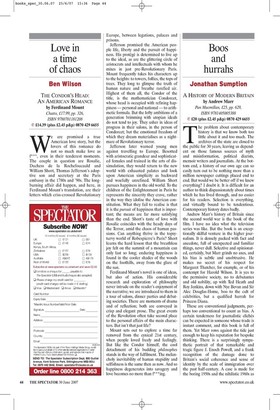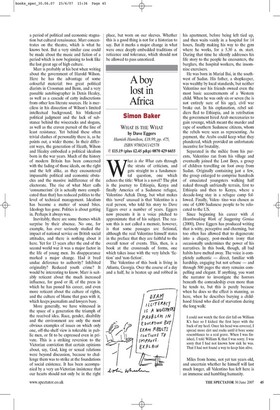Boos and hurrahs
Jonathan Sumption A HISTORY OF MODERN BRITAIN by Andrew Marr Pan Macmillan, £25, pp. 629, ISBN 9781405005388 © £20 (plus £2.45 p&p) 0870 429 6655 The problem about contemporary history is that we know both too little about it and too much. The archives of the state are closed to the public for 30 years, leaving us dependent on those famous sources of myth and misinformation, political diarists, memoir writers and journalists. At the bottom end, a history of our own age can so easily turn out to be nothing more than a million newspaper cuttings placed end to end. But would we be better off if we knew everything? I doubt it. It is difficult for an author to think dispassionately about times which he has lived through, and no easier for his readers. Selection is everything, and virtually bound to be tendentious. Contemporary history dates badly.
Andrew Marr's history of Britain since the second world war is the book of the film. I have no idea what the television series was like. But the book is an exceptionally skilful venture in the higher journalism. It is densely packed with fact and anecdote, full of unexpected and familiar things, never dull. Selective and opinionated, certainly, but Marr grinds no axes, and his bias is subtle and unobtrusive. He makes no secret of his respect for Margaret Thatcher, for example, or of his contempt for Harold Wilson. It is yes to the permissive society, no to debutantes and old nobility, up with Ted Heath and Roy Jenkins, down with Nye Bevan and Sir Alec Douglas-Home, boo to the cult of celebrities, but a qualified hurrah for Princess Diana.
These are conventional judgments, perhaps too conventional to count as bias. A certain tenderness for journalistic clichés can be expected in someone whose trade is instant comment, and this book is full of them. Yet Marr rows against the tide just enough to keep his reputation for bespoke thinking. There is a surprisingly sympathetic portrait of that remarkable and tragic figure J. Enoch Powell, and a frank recognition of the damage done to Britain's social coherence and sense of identity by the scale of immigration over the past half-century. A case is made for the boring 1950s and the nihilistic 1960s as www.spectator.co.uk a period of political and economic stagnation but cultural renaissance. Marr concentrates on the theatre, which is what he knows best. But a very similar case could be made about the music and fiction of a period which is now beginning to look like the last great age of high culture.
Marr is probably at his best when writing about the government of Harold Wilson. Here he has the advantage of some colourful material: two great political diarists in Crossman and Benn, and a very passable autobiographer in Denis Healey, as well as a cascade of catty indiscretions from other less literate sources. He is merciless in his dissection of Wilson's limited intellectual background, his blinkered political judgment and the lack of substance behind the wisecracks and slogans, as well as the craven pursuit of the line of least resistance. Yet behind these often trivial clashes of personality there is, as he points out, a wider theme. In their different ways, the generation of Heath, Wilson and Healey embodied a political idealism born in the war years. Much of the history of modern Britain has been concerned with the fading of those ideals, on the right and the left alike, as they encountered impassable political and economic obstacles and the massive indifference of the electorate. The rise of what Marr calls 'consumerism' (it is actually more complicated than that) has reduced politics to the level of technical management. Idealism has become a matter of sound bites. Ideology has gone. Politics is about getting in. Perhaps it always was.
Inevitably, there are some themes which surprise by their absence. No one, for example, has ever seriously studied the impact of national service on British social attitudes, and there is nothing about it here. Yet for 13 years after the end of the second world war it was a major factor in the life of young men. Its disappearance marked a major change. Had it bred undue deference to authority? Inhibited originality? Reduced youth crime? It would be interesting to know. Marr is suitably reticent about the much increased influence, for good or ill, of the press in which he has passed his career, and even more reticent about the culture of rights, and the culture of blame that goes with it, which keeps journalists and lawyers busy.
More generally, we have witnessed in the space of a generation the triumph of the received idea. Race, gender, disability and the environment are only the most obvious examples of issues on which only one, off-the-shelf view is tolerable in public men, or fit to be expressed even in private. This is a striking reversion to the Victorian conviction that certain opinions about, say, God, king or sexual relations were beyond discussion, because to challenge them was to strike at the foundations of social existence. It has been accompanied by a very un-Victorian insistence that our hearts should not only be in the right place, but worn on our sleeves. Whether this is a good thing is not for a historian to say. But it marks a major change in what were once deeply embedded traditions of reticence and tolerance, which should not be allowed to pass unnoticed.



















































































 Previous page
Previous page